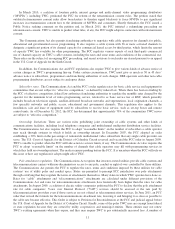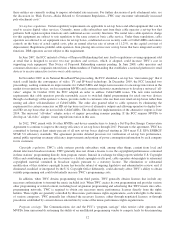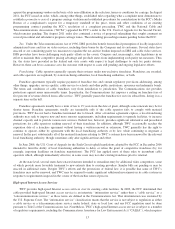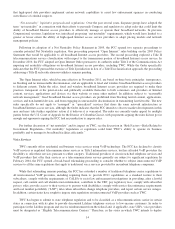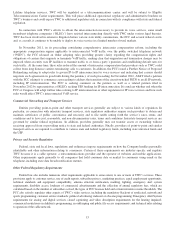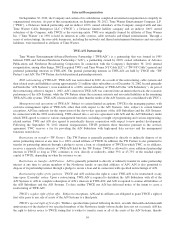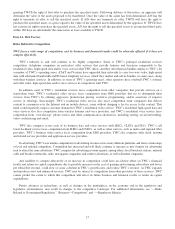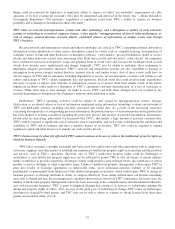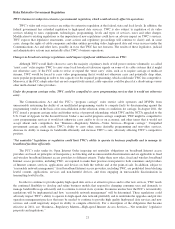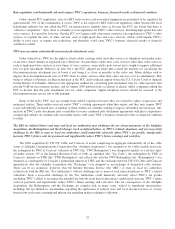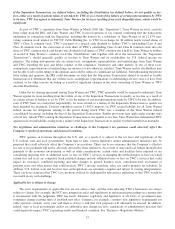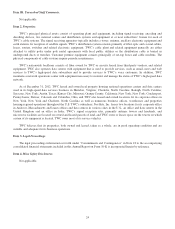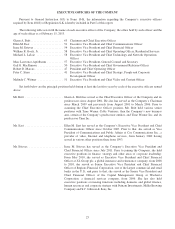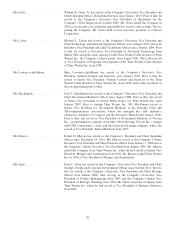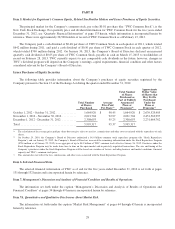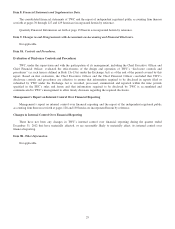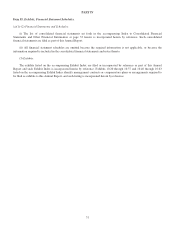Time Warner Cable 2012 Annual Report Download - page 31
Download and view the complete annual report
Please find page 31 of the 2012 Time Warner Cable annual report below. You can navigate through the pages in the report by either clicking on the pages listed below, or by using the keyword search tool below to find specific information within the annual report.Risks Related to Government Regulation
TWC’s business is subject to extensive governmental regulation, which could adversely affect its operations.
TWC’s video and voice services are subject to extensive regulation at the federal, state and local levels. In addition, the
federal government has extended regulation to high-speed data services. TWC is also subject to regulation of its video
services relating to rates, equipment, technologies, programming, levels and types of services, taxes and other charges.
Modification to existing regulations or the imposition of new regulations could have an adverse impact on TWC’s services.
TWC expects that legislative enactments, court actions and regulatory proceedings will continue to clarify and, in some
cases, change the rights of cable companies and other entities providing video, high-speed data and voice services under the
Communications Act and other laws, possibly in ways that TWC has not foreseen. The results of these legislative, judicial
and administrative actions may materially affect TWC’s business operations.
Changes in broadcast carriage regulations could impose significant additional costs on TWC.
Although TWC would likely choose to carry the majority of primary feeds of full power stations voluntarily, so-called
“must carry” rules require TWC to carry some local broadcast television signals on some of its cable systems that it might
not otherwise carry. If the FCC seeks to revise or expand the “must carry” rules, such as to require carriage of multicast
streams, TWC would be forced to carry video programming that it would not otherwise carry and potentially drop other,
more popular programming in order to free capacity for the required programming, which could make TWC less competitive.
Moreover, if the FCC adopts rules that are not competitively neutral, cable operators could be placed at a disadvantage versus
other multi-channel video providers.
Under the program carriage rules, TWC could be compelled to carry programming services that it would not otherwise
carry.
The Communications Act and the FCC’s “program carriage” rules restrict cable operators and MVPDs from
unreasonably restraining the ability of an unaffiliated programming vendor to compete fairly by discriminating against the
programming vendor on the basis of its non-affiliation in the selection, terms or conditions for carriage. In August 2011, the
FCC issued a program carriage order and further notice of proposed rulemaking, which TWC and the NCTA appealed to the
U.S. Court of Appeals for the Second Circuit. Under a successful program carriage complaint, TWC might be compelled to
carry programming services it would not otherwise carry and/or to do so on economic and other terms that it would not
accept absent such compulsion. See “Business—Regulatory Matters—Video Services—Program carriage.” Compelled
government carriage could reduce TWC’s ability to carry other, more desirable programming and non-video services,
decrease its ability to manage its bandwidth efficiently and increase TWC’s costs, adversely affecting TWC’s competitive
position.
“Net neutrality” legislation or regulation could limit TWC’s ability to operate its business profitably and to manage its
broadband facilities efficiently.
The FCC’s rules under its Open Internet Order imposing net neutrality obligations on broadband Internet access
providers are based on principles of transparency, no blocking and no unreasonable discrimination and are applicable to fixed
and wireless broadband Internet access providers to different extents. Under these new rules, fixed and wireless broadband
Internet access providers, including TWC, are required to make their practices transparent to both consumers and providers
of Internet content, services, applications and devices on both the website and at the point-of-sale. In addition, subject to
“reasonable network management,” fixed broadband Internet access providers, including TWC, are prohibited from blocking
lawful content, applications, services and non-harmful devices, and from engaging in unreasonable discrimination in
transmitting lawful traffic.
In order to continue to provide quality high-speed data service at attractive prices and to offer new services, TWC needs
the continued flexibility to develop and refine business models that respond to changing consumer uses and demands, to
manage bandwidth usage efficiently and to continue to invest in its systems. It remains unclear how the FCC’s net neutrality
regulations will be implemented and how “reasonable network management” will be determined. These regulations could
adversely impact TWC’s ability to operate its high-speed data network profitably and to undertake the upgrades and put into
operation management practices that may be needed to continue to provide high quality high-speed data services and new
services and could negatively impact its ability to compete effectively. For a description of the obligations that became
effective in 2011, see “Business—Regulatory Matters—High-speed Internet Access Services—‘Net neutrality’ legislative
proposals and regulations.”
21


